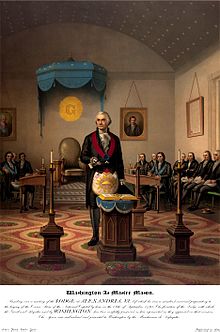Joining a lodge
Candidates for Freemasonry will have met most active members of the lodge they are joining before they are initiated. The process varies between jurisdictions, but the candidate will typically have been introduced by a friend at a lodge social function, or at some form of open evening in the lodge. In modern times, interested people often track down a local lodge through the Internet. The onus is on candidates to ask to join; while candidates may be encouraged to ask, they are never invited. Once the initial inquiry is made, an interview usually follows to determine the candidate's suitability. If the candidate decides to proceed from here, the lodge is balloted before he can be accepted.[30]
The absolute minimum requirement of any body of Freemasons is that the candidate must be free, and considered to be of good character.[31] There is usually an age requirement, varying greatly between Grand Lodges, and (in some jurisdictions) capable of being overridden by a dispensation from the Grand Lodge. The underlying assumption is that the candidate should be a mature adult.[30]
In addition, most Grand Lodges require the candidate to declare a belief in a Supreme Being. In a few cases, the candidate may be required to be of a specific religion. The form of Freemasonry most common in Scandinavia (known as the Swedish Rite), for example, accepts only Christians.[32] At the other end of the spectrum, "Liberal" or Continental Freemasonry, exemplified by the Grand Orient de France, does not require a declaration of belief in any deity, and accepts atheists (a cause of discord with the rest of Freemasonry).[33][34]
During the ceremony of initiation, the candidate is expected to swear (usually on a volume of sacred text appropriate to his personal religious faith) to fulfil certain obligations as a Mason. In the course of three degrees, new masons will promise to keep the secrets of their degree from lower degrees and outsiders, and to support a fellow Mason in distress (as far as practicality and the law permit).[10] There is instruction as to the duties of a Freemason, but on the whole, Freemasons are left to explore the craft in the manner they find most satisfying. Some will further explore the ritual and symbolism of the craft, others will focus their involvement on the social side of the lodge, while still others will concentrate on the charitable functions of the lodge.[35][36]

No comments:
Post a Comment